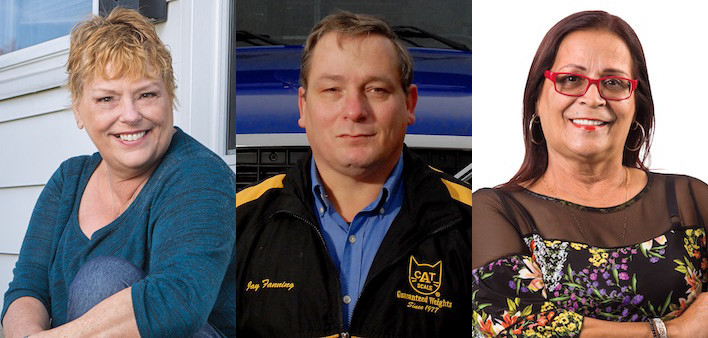Linda Sidle
I was diagnosed with HIV in 1989, eight days after I buried my husband. I finally understood what he had meant when he used to say to me, “I have a surprise for you and you ain’t gonna like it.”
He had known when we started dating on my 39th birthday, almost three years prior, that he was HIV positive. I died socially the day I was diagnosed.
At the time, my best friends were Tony and his partner Dave. We ran in a group of about 12 people. Tony was like my little brother. They were the only ones I told besides my 20-year-old daughter, Mikki.
I led a life of secrets and dodges. I kept my federal job. They couldn’t fire me for my diagnosis unless I missed a lot of work. I had good guaranteed insurance that I paid a pretty penny for. I retired after 38 years of service, 25 of them while living with HIV.
I became a prevention speaker in Ohio for many groups. I loved doing that. It was therapy. Over time, however, the women were included less and less for speaking engagements. I’m the sole surviving charter member of Womancare, Cincinnati’s first women’s support group.
Tony died. Larry and Brian died. Janie died. Nancy, who contracted HIV by a transfusion, died. That was the first 10 years.
In those 10 years, I never met a heterosexual HIV-positive man in Cincinnati. We were denied a co-ed support group. The organizers believed we just wanted to hook up. Actually, we just wanted to be with people who lived like us and be able to say “AIDS” out loud.
Many heterosexuals I’ve met treat other straights as bad, if not worse, than they treat gays. To hear them tell it, they believe HIV-positive heterosexual men are all drug users and HIV-positive heterosexual women are all easy.
I tried dating in the HIV-negative world, but I absolutely never ever considered it again after a guy stood up at a beer garden to scream “but I wanted to touch you!” Still hurts. To the bone.
I even tried a well-known dating site. I revealed my status. First guy I met for coffee was there strictly for sex. I ran to my car. Another acted like he’d been dropped naked into a leper colony.
I’m 72 years old this December. I stay active. Bowling and oil painting. I drive 50 miles to see my ID doctor in private practice.
I became a member of the development committee here in my county to establish a homeless shelter. We are looking to open a men’s shelter first. I’ve been very involved with this project.
I’ve met some fantastic people who are also living with HIV. But a view of the big picture, I was slammed into a life where I’m nobody’s anybody. Companionship consists of my dogs and cats. You asked me, so I told you. This isn’t a pity paper. Just the raw truth.
Linda was profiled in an article titled “Living With Lipo” in a 2016 POZ Focus special issue.
Jay C. Fanning
“The Good, The Bad and The Ugly” of HIV can be written in as many ways as there are people living with the virus.
The Good: I was raised in a small farming community in Oklahoma. I lived through the years when treatments were not available. I have been undetectable for nearly 13 years and the antiretrovirals that have made that possible are astounding.
The Bad: We still are facing HIV/AIDS stigma worldwide.
The Ugly: There is still rampant ignorance and misinformation. Widespread education is needed around the globe to encourage those who are sexually active to be tested for the virus and treated if they are HIV positive.
Jay was profiled in an article titled “The Long Haul” in the March 2008 issue of POZ.
Rosa Rivera Avilés
When HIV came into my life in 1997, I didn’t know much about it. HIV was said to be equal to AIDS, so equal to imminent death.
Having a diagnosis of bipolar disorder 1, I always cherished the idea of dying. When I processed that I could actually die, I decided to live. The only way to continue living was to know what uninvited guest had entered my body—I named it Crunch.
I made my diagnosis public. It was the best way for me to accept it. I experienced the stigma, rejection and discrimination. Then I learned about HIV—my rights, related laws, everything that guaranteed my life.
I started HIV treatment only months after contracting the virus. I returned to college to complete my degree and attended every conference on HIV/AIDS held in Puerto Rico, which is where I’m from. I applied to the different groups working on issues related to HIV/AIDS in the island and I still remain in many of them.
HIV taught me to love life, to fight for it. I changed my social vision, my mission as a human being. Today I dedicate myself to full-time activism in and out of Puerto Rico.
We need to educate in order to eradicate the stigma, as this is the only way we will be able to eradicate HIV transmission. We need to empower to get our voices heard in every corner of the world: we are not HIV, we are people.
Rosa was a POZ 100 honoree highlighted in the December 2018 issue of POZ.







2 Comments
2 Comments